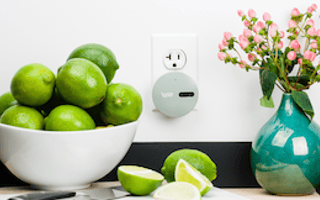
Smart home devices like the Amazon Echo can make buying products online incredibly easy. But many devices tie users to specific e-commerce ecosystems, requiring them to sacrifice choice for convenience.
Chicago startup Lystr is challenging that approach with a retailer-agnostic IoT kitchen device designed to make grocery shopping easier.
“Consumers shop at an average of 5.4 different stores for groceries,” CEO Kara Scanlin said, citing a study from the International Council of Shopping Centers. “For millennials, that number is 5.9 stores. The data suggests we still value choice in where we purchase our groceries.”
Instead of putting in an order with a predetermined retail partner, Lystr sticks to a single function: adding items to a digital grocery list. The Wi-Fi-enabled device features a built-in barcode scanner and voice recognition. Users can add items either by scanning them or asking Lystr to add them to the list.
Lystr recognizes product-specific barcodes, a useful feature for brand-loyal but forgetful consumers and families where everyone adds to the grocery list.
Adding an item via voice requires uses to say, “Hey Lystr,” and name the product. Unlike the barcode scanner, items added via voice are not brand-specific.
Lystr sorts items by aisle, with like items placed together. Lists can be sorted by store, and multiple users can access the same account. No purchases are made through the app.
“We’re really positioning ourselves as that one piece of hardware that is your relationship with your home consumables,” Scanlin said. “Yes, it’s a single function, but we’re doing it damn good.”
Scanlin came up with the idea for Lystr back in 2015 after forgetting to buy a box of oatmeal while grocery shopping. This prompted her to begin thinking about how a device with a built-in barcode scanner could better organize her shopping list. Since then, smart home devices have taken off in popularity, particularly Amazon’s range of Alexa products.
“Yes, Amazon Alexa and those Dash buttons do present competition,” Scanlin said. “But it’s even more so validation for the fact that people are adopting and turning towards these quick ways to add things to a grocery list.”
Scanlin is betting that Lystr’s single function and retailer-agnostic stance will help it stand out from the competition. The company is putting that theory to the test with a Kickstarter campaign that seeks to raise $50,000. Those who pledge early can get a Lystr for $99. Scanlin estimates the device will ultimately retail for $119.
At the time of this writing, Lystr's Kickstarter campaign has been live for one day and has raised $7,071.
Lystr was a member of the spring 2017 WiStem cohort. The company has four full-time employees and is based out of mHUB.
Image via Lystr.
Does your startup have a story to tell? Shoot us an email or follow us on Twitter @BuiltInChicago.






